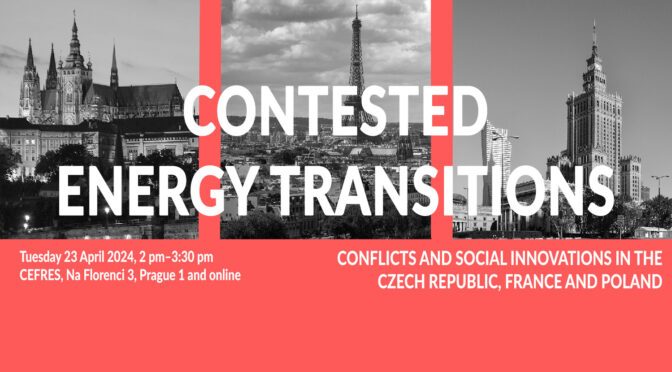
Zpochybňované transformace energetiky.
Konflikty a sociální inovace v České republice, Polsku, Německu a Francii
Zahájení výzkumného projektu realizovaného v rámci programu TANDEM AV ČR-CNRS iniciovaného Akademií věd České republiky, Univerzitou Karlovou a CEFRES/CNRS.
Kdy? úterý 23. dubna 2024, 14:00–15:30
Kde? Knihovna CEFRESu, Na Florenci 3, Praha 1, nebo online (rádí pošleme odkaz, napíšte nám na cefres@cefres.cz)
Jazyk: angličtina
Za účasti koordinátorů projektu:
A
Na úvod promluví:
Tomáš KOSTELECKÝ, člen Akademické rady AV ČR.
Prezentace
Gilles Lepesant, Martin Ďurďovič a Krzysztof Tarkowski představí projekt sociálního výzkumu energetiky. Projekt usiluje o lepší porozumění negativním postojům a konfliktům, které doprovázejí přejímání evropských politik energetické transformace, a odhalení nových vzorců energetického vládnutí pro překonání nadcházejících výzev. Výzkum se opírá o komparativní přístup zahrnující několik zemí a zaměří se na případové studie na lokální nebo regionální úrovni.
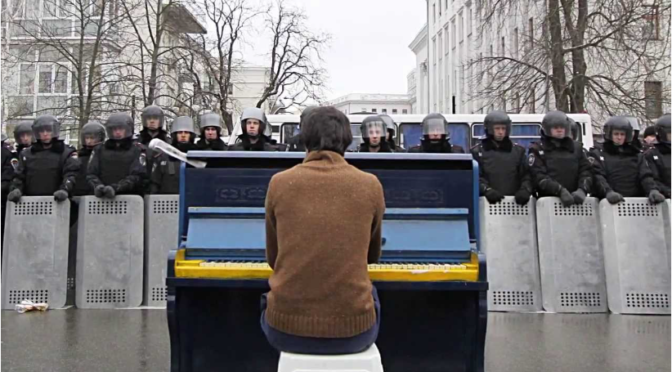
Zpívající podřízená.
Od zvukového odporu k hudební diplomacii ve válečné Ukrajině
Úvodní setkání výzkumného projektu realizovaného v rámci projektu Tandem UK-CNRS, podporovaného Univerzitou Karlovou, CNRS a CEFRES.
Datum: 9. dubna 2024 od 14:00 do 15:30
Místo konání: CEFRES, Na Florenci 3, Praha 1
Jazyk: angličtina
Koordinátorky projektu: Valeria KORABLYOVA(CEFRES / Fakulta sociálních věd Univerzity Karlovy) and
Louisa MARTIN-CHEVALIER (CEFRES / Sorbonne Université)
Setkání slavnostně zahájí:
- Stéphane CROUZAT, Velvyslanec Francie v České republice
- Ladislav KRIŠTOUFEK, Prorektor pro výzkum, Univerzita Karlova
- William BERTHOMIÈRE, ředitel pro evropské a mezinárodní záležitosti v CNRS Sciences humaines et sociales.
Abstrakt
Valeria Korablyová a Louisa Martin-Chevalierová představí svůj výzkumný projekt věnovaný hudebnímu rozměru ukrajinského odporu jako prostředku úniku ze podřízené pozice dvojí periferie ve slepé skvrně mezi EU a Ruskem. Projekt spojuje dva akademické podobory – kulturní diplomacii a postkoloniální studia – s cílem odhalit, jak ukrajinští hudebníci a aktivisté využívají hudební prostředky ke svému zviditelnění na globální úrovni a ke zvýšení geokulturního statusu své země v povědomí mezinárodního publika. Ukrajinci využívají svou měkkou sílu k prezentaci své země a k získání mezinárodní podpory pro svou věc, a to prostřednictvím různých platforem, Od evropské operní scény až po hudební soutěž Eurovize.
Program TANDEM od roku 2018 podporuje excelentní výzkum v oblasti společenských a humanitních věd a spojuje české a francouzské kolegy s cílem zintenzivnit vědeckou spolupráci mezi našimi zeměmi v rámci Evropského výzkumného prostoru. Program je společným dílem CEFRES, CNRS SHS, UK a AV ČR zaštítěným Platformou CEFRES. Jeho bývalí členové získali dva granty ERC, včetně projektu BOAR.
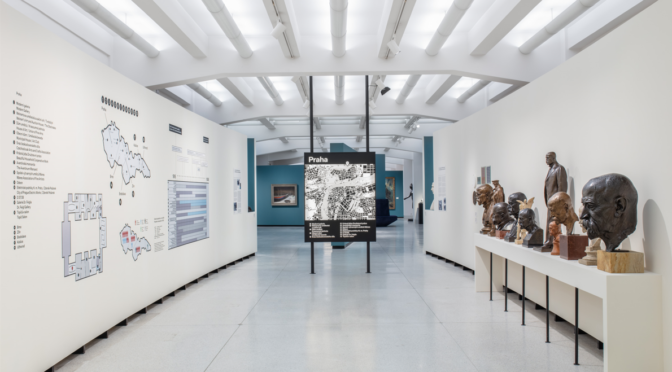
Muzea umění a jejich narativy. Patří pojem „národní” minulosti?
Diskusi u kulatého stolu organizují v rámci nového cyklu setkání Résonnances / Rezonance Filosofický ústav Akademie věd České republiky (AVČR), CEFRES, Francouzský institut v Praze a Národní galerie v Praze.
Datum: 12. března 2024, 17:00 –18:30
Místo: Veletržní palác, Národní galerie v Praze
Dukelských Hrdinů 47, Praha 7-Holešovice
Auditorium, 6. patro
Jazyk: francouzština a čeština: simultánní tlumočení zajištěno
Účastníci
Sébastien ALLARD (ředitel oddělení malby, Musée du Louvre),
Danièle COHN (profesorka estetiky a filozofie umění, Université Paris I),
Milena BARTLOVÁ (profesorka dějin umění, Vysoká škola uměleckoprůmyslová v Praze – UMPRUM)
Anna PRAVDOVÁ (kurátorka sbírky moderního umění, Národní galerie v Praze – NGP) Moderuje: Lara BONNEAU (vědecká asistentka, Filosofický ústav Akademie věd – FLÚ AV ČR)
Abstrakt
Pokračování textu Muzea umění a jejich narativy →
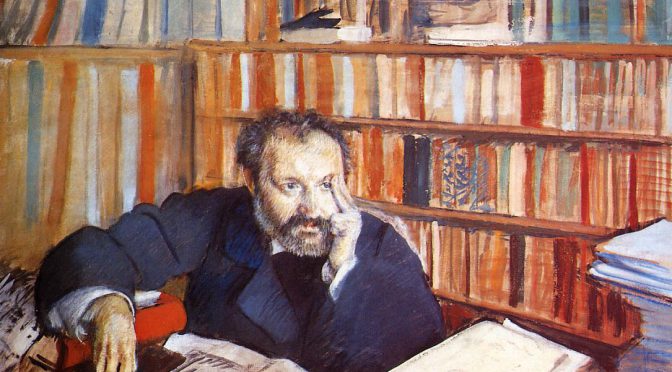
Workshop
Kdy: 30. listopadu–2. prosince 2023
Kde: Filosofický ústav Akademie věd České republiky, Jilská 1, Praha 1 (zasedací místnost, 1. patro) / CEFRES, Na Florenci 3, Praha 1
Jazyk: angličtina
Organizuje CEFRES a Filosofický ústav Akademie věd České republiky (FLÚ AVČR).
Téze
Zdá se, že rozkol mezi filozofií vědy a studii vědy a techniky (STS – Science and Technology Studies) je na mezinárodní scéně větší než kdykoli předtím. Od velkých sporů mezi relativisty a realisty v 80. letech 20. století a období vědeckých válek v 90. letech se od sebe obě komunity vzdálily a v jistém smyslu se dostaly až za hranice těchto neshod. I přes tyto neshody by celá řada specialistů z oblasti studií vědy a techniky mohla těžit z filozofické perspektivy a opačně, filozofové vědy by mohli těžit z jiné perspektivy na problémy, kterými se dlouhodobě zabývají historie a sociologie vědy a také studia vědy a techniky. Pokračování textu Filozofie vědy a studia vědy a techniky optikou technologie →

 Debata u kulatého stolu o knize Ronana Hervoueta – Pozastavená revoluce. Bělorusové proti autoritářskému státu, kterou vydalo nakladatelství Éditions Plein Jour.
Debata u kulatého stolu o knize Ronana Hervoueta – Pozastavená revoluce. Bělorusové proti autoritářskému státu, kterou vydalo nakladatelství Éditions Plein Jour.
Datum a místo konání: 28. dubna, 16:30 v CEFRESu a online (pro odkaz na Zoom kontaktujte cefres[@]cefres.cz)
Organizátoři: CEFRES a Courrier d’Europe centrale
Jazyk: francouzština
Zatímco bylo Bělorusko na dvacet pět let zmrazeno pod vlivem autoritářského režimu a železné vlády Alexandra Lukašenka, s blížícími se prezidentskými volbami v roce 2020 přichází naděje na změnu. Od srpna a během následujících měsíců se občané masově vzbouřili. Odsuzují rozsáhlé volební podvody a požadují odchod diktátora. Boj je intenzivní, období revoluční. Celá státní a policejní struktura se otřásá. Ale krutá a rozsáhlá represe hnutí ukončila. Statisíce lidí prchají do zahraničí.
Pokračování textu „Bělorusko: Pozastavená revoluce“ →
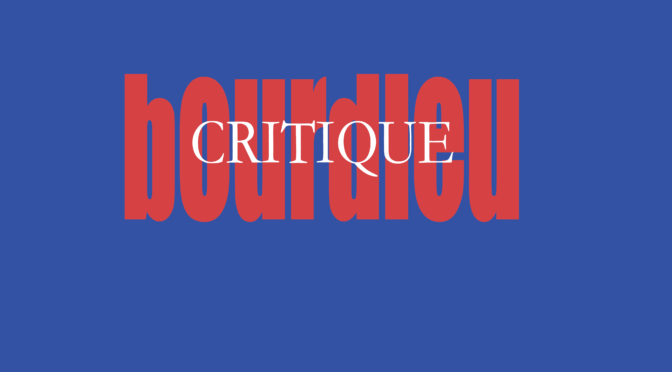
On the occasion of the twentieth anniversary of Pierre Bourdieu’s death, CEFRES, in collaboration with the Department of Czech and Comparative Literature of the Charles University in Prague organizes a round table on the development of the Bourdieu’s central concepts during last two decades.
Bourdieu’s Legacy in Literary Studies: Expanding Territories, Changing Concepts
When: Friday, December 2, 2022, 4.30-6.30pm
Where: CEFRES library, Prague and on line
To register, please contact us at the address cefres(@)cefres.cz
Language: English
Organizers: CEFRES & Department of Czech and Comparative Literature, Faculty of Arts, Charles University
Participants:
Anna SCHUBERTOVÁ (Department of Czech and Comparative Literature, Faculty of Arts, Charles University)
Csaba SZALÓ (Faculty of Social Studies, Masaryk University)
Jan VÁŇA (Institute of Czech literature, Czech Academy of Sciences)
Eva VOLDŘICHOVÁ-BERÁNKOVÁ (Department of Romance Studies, Faculty of Arts, Charles University)
Moderated by: Josef ŠEBEK (Department of Czech and Comparative Literature, Faculty of Arts, Charles University)
As in many other branches of research, Bourdieu’s contribution in literary studies is unquestionable. The theory of the literary field, which had been in the making since the end of the 1960s and found its most comprehensive and developed shape in The Rules of Art (1992), has a lasting impact both in literary theory and literary history. Other Bourdieu’s works inspire literary research as well, from the early article “Intellectual Field and Creative Project” (1966) to Pascalian Meditations (1997). His lectures at Collège de France whose transcripts are still being published also offer an abundance of impulses for literary scholarship. Yet equally substantial is the production of his collaborators and successors that maintain this living body of work, transpose it to different theoretical and methodological contexts and provide its operationalization and critical analysis. In the framework of the series of events PIERRE BOURDIEU 2022 we want to address some of the nodal points of these developments in the past two decades, focusing on the expanded territory of research – intellectual field, translation studies, study of literature and politics, world literature, ethnography of authors, the study of self-presentation of authors in current media environment, etc. – and concepts ranging from new perspectives on the literary field to ethos and author’s posture. We want to trace these developments and assess Bourdieu’s magisterial contribution in the context of current research.






 Debata u kulatého stolu o knize
Debata u kulatého stolu o knize 